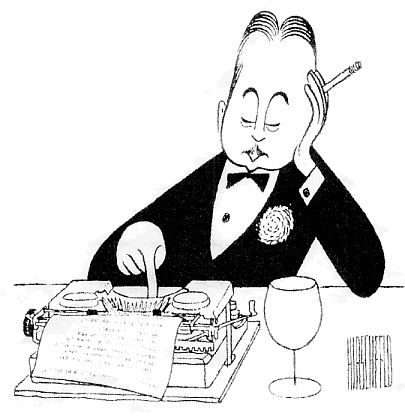Tenor
Turino Young Noblemen of Venice.
Tenor
Bombo Young Noblemen of Venice.
Basso
Ludovico Assassins in the service of Cafeteria Rusticana
Basso
Astolfo Assassins in the service of Cafeteria Rusticana
Methodist
Townspeople, Cabbies and Sparrows
Argument
“Il Minnestrone” is an allegory of the two sides of a man’s nature (good and bad), ending at last in an awfully comical mess with everyone dead.
ACT I
A Public Square, Ferrara.—During a peasant festival held to celebrate the sixth consecutive day of rain, Rudolpho, a young nobleman, sees Lilliano, daughter of the village bell-ringer, dancing along throwing artificial roses at herself. He asks of his secretary who the young woman is, and his secretary, in order to confuse Rudolpho and thereby win the hand of his ward, tells him that it is his (Rudolpho’s) own mother, disguised for the festival. Rudolpho is astounded. He orders her arrest.
ACT 2
Banquet Hall in Gorgio’s Palace.—Lilliano has not forgotten Breda, her old nurse, in spite of her troubles, and determines to avenge herself for the many insults she received in her youth by poisoning her (Breda). She therefore invites the old nurse to a banquet and poisons her. Presently a knock is heard. It is Ugolfo. He has come to carry away the body of Michelo and to leave an extra quart of pasteurized. Lilliano tells him that she no longer loves him, at which he goes away, dragging his feet sulkily.
ACT 3
In Front of Emilo’s House.—Still thinking of the old man’s curse, Borsa has an interview with Cleanso, believing him to be the Duke’s wife. He tells him things can’t go on as they are, and Cleanso stabs him. Just at this moment Betty comes rushing in from school and falls in a faint. Her worst fears have been realized. She has been insulted by Sigmundo, and presently dies of old age. In a fury, Ugolfo rushes out to kill Sigmundo and, as he does so, the dying Rosenblatt rises on one elbow and curses his mother.
III—LUCY DE LIMA
Scene: Wales.
Time: 1700 (Greenwich).
Cast
William Wont, Lord of Glennnn
Basso
Lucy Wagstaff, his daughter
Soprano
Bertram, her lover
Tenor
Lord Roger, friend of Bertram.
Soprano
Irma, attendant to Lucy
Basso
Friends, Retainers and Members of the local Lodge of Elks.
Argument
“Lucy de Lima,” is founded on the well-known story by Boccaccio of the same name and address.
ACT I
Gypsy Camp Near Waterbury.—The gypsies, led by Edith, go singing through the camp on the way to the fair. Following them comes Despard, the gypsy leader, carrying Ethel, whom he has just kidnapped from her father, who had previously just kidnapped her from her mother. Despard places Ethel on the ground and tells Mona, the old hag, to watch over her. Mona nurses a secret grudge against Despard for having once cut off her leg and decides to change Ethel for Nettie, another kidnapped child. Ethel pleads with Mona to let her stay with Despard, for she has fallen in love with him on the ride over. But Mona is obdurate.
ACT 2
The Fair.—A crowd of sightseers and villagers is present. Roger appears, looking for Laura. He can not find her. Laura appears, looking for Roger. She can not find him. The gypsy queen approaches Roger and thrusts into his hand the locket stolen from Lord Brym. Roger looks at it and is frozen with astonishment, for it contains the portrait of his mother when she was in high school. He then realizes that Laura must be his sister, and starts out to find her.
ACT 3
Hall in the Castle.—Lucy is seen surrounded by every luxury, but her heart is sad. She has just been shown a forged letter from Stewart saying that he no longer loves her, and she remembers her old free life in the mountains and longs for another romp with Ravensbane and Wolfshead, her old pair of rompers. The guests begin to assemble for the wedding, each bringing a roast ox. They chide Lucy for not having her dress changed. Just at this moment the gypsy band bursts in and Cleon tells the wedding party that Elsie and not Edith is the child who was stolen from the summer-house, showing the blood-stained derby as proof. At this, Lord Brym repents and gives his blessing on the pair, while the fishermen and their wives celebrate in the courtyard.

